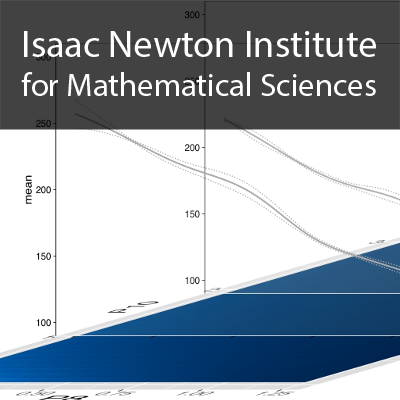MSG Design of Experiments Seminar Series: Simulation-based Bayesian experimental design for computationally intensive models
52 mins 24 secs,
95.86 MB,
MP3
44100 Hz,
249.78 kbits/sec
Share this media item:
Embed this media item:
Embed this media item:
About this item

| Description: |
Huan, X
Wednesday 20th June 2018 - 14:55 to 15:45 |
|---|
| Created: | 2018-06-22 09:10 |
|---|---|
| Collection: | Uncertainty quantification for complex systems: theory and methodologies |
| Publisher: | Isaac Newton Institute |
| Copyright: | Huan, X |
| Language: | eng (English) |
| Distribution: |
World
|
| Explicit content: | No |
| Aspect Ratio: | 16:9 |
| Screencast: | No |
| Bumper: | UCS Default |
| Trailer: | UCS Default |
| Abstract: | Selecting and performing experiments that produce the most useful data is extremely valuable in engineering and science applications where experiments are costly and resources are limited. Simulation-based experimental design thus provides a rigorous mathematical framework to systematically quantify and maximize the value of experiments while leveraging the existing knowledge and predictive capability of an available model. We are particularly interested in design settings that accommodate nonlinear and computationally intensive models, such as those governed by ordinary and partial differential equations. Employing principles from Bayesian statistics to characterize and quantify uncertainty, we seek experiments that maximize the expected information gain. Computing these optimal designs using conventional approaches, however, is generally intractable. Major challenges include high dimensional parameter spaces, expensive model simulations, and numerical approximation and optimization of the expected information gain. We thus describe practical numerical methods to help overcome these obstacles, including global sensitivity analysis, surrogate modeling via polynomial chaos, and stochastic optimization. The overall methodology is demonstrated through the design of combustion experiments for optimal learning of chemical rate parameters, and of configurations for a supersonic jet engine to obtain measurements most informative on turbulent flow parameters. |
|---|---|
Available Formats
| Format | Quality | Bitrate | Size | |||
|---|---|---|---|---|---|---|
| MPEG-4 Video | 640x360 | 1.94 Mbits/sec | 762.53 MB | View | Download | |
| WebM | 640x360 | 544.99 kbits/sec | 209.03 MB | View | Download | |
| iPod Video | 480x270 | 522.17 kbits/sec | 200.21 MB | View | Download | |
| MP3 * | 44100 Hz | 249.78 kbits/sec | 95.86 MB | Listen | Download | |
| Auto | (Allows browser to choose a format it supports) | |||||

